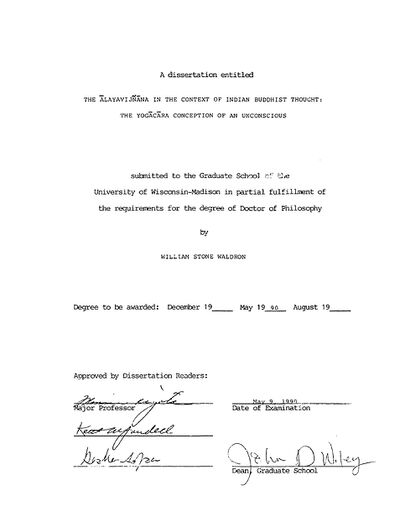The Ālayavijñāna in the Context of Indian Buddhist Thought: The Yogācāra Conception of an Unconscious
< Books
Abstract
The thesis focuses on the relations between mind and karma and the continuity of life in saṃsāra based upon a concept of mind, the ālayavijñāna, as presented in the texts of Asaṅga and Vasubandhu of the Yogācāra school of Indian Buddhism, A.D. 4-5th centuries. It has been the topic of many sectarian disputes as well as the springboard for several far-reaching doctrinal developments, so it is desirable to examine it within its early Indian Buddhist context.
The first section presents the multivalent viññāṇa of the Pali Canon and related concepts. It demonstrates that the major characteristics later predicated of the ālayavijñāna were present in an unsystematized but implicit form in the viññāṇa of the early discourses.
The next section describes the systematic psychological analysis developed by the Abhidharma and its consequent problematics. It argues that the incongruity of Abhidharmic analysis with the older unsystematized doctrines led to major theoretical problems concerning the key concepts of kleśa and karma, to which the Sautrāntika school offered the concept of seeds (bija).
The third section, based primarily upon the texts translated herein, depicts the origination and gradual development of the ālayavijñāna within the Yogācāra school from a somatic "life principle", to an explicitly unconscious mind, to its final bifurcation into an unconscious afflicted mind (kliṣṭa-manas) and a passive respository of karmic seeds, the latent loci of kleśa and karma, respectively.
The last section compares the ālayavijñāna systematically with Freud's and Jung's concepts of the unconscious, concluding that their respective philosophical milieus led both traditions to conceptions of unconscious mental processes as necessary compensations for strictly intentional epistemological models.
In the appendix the major texts presenting the ālayavijñāna, Chaps. V and VIII.37 of the Saṃdhinirmocana Sūtra, part of the Viniścaya-saṃgrahaṇī of the Yogācārabhūmi, and Ch. 1 of the Mahāyāna-saṃgraha, are translated and extensively annotated in order to contextualize the minutiae of this concept of mind with its canonical precursors and its Abhidharmic contemporaries. (Source: ProQuest)
| Citation | Waldron, William S. "The Ālayavijñāna in the Context of Indian Buddhist Thought: The Yogācāra Conception of an Unconscious." PhD diss., University of Wisconsin-Madison, 1990. |
|---|---|

